
Le Bal du Moulin de la Galette Auguste Renoir (18411919)
This painting is doubtless Renoir's most important work of the mid 1870's and was shown at the Impressionist exhibition in 1877. Though some of his friends appear in the picture, Renoir's main aim was to convey the vivacious and joyful atmosphere of this popular dance garden on the Butte Montmartre.The study of the moving crowd, bathed in natural and artificial light, is handled using vibrant.
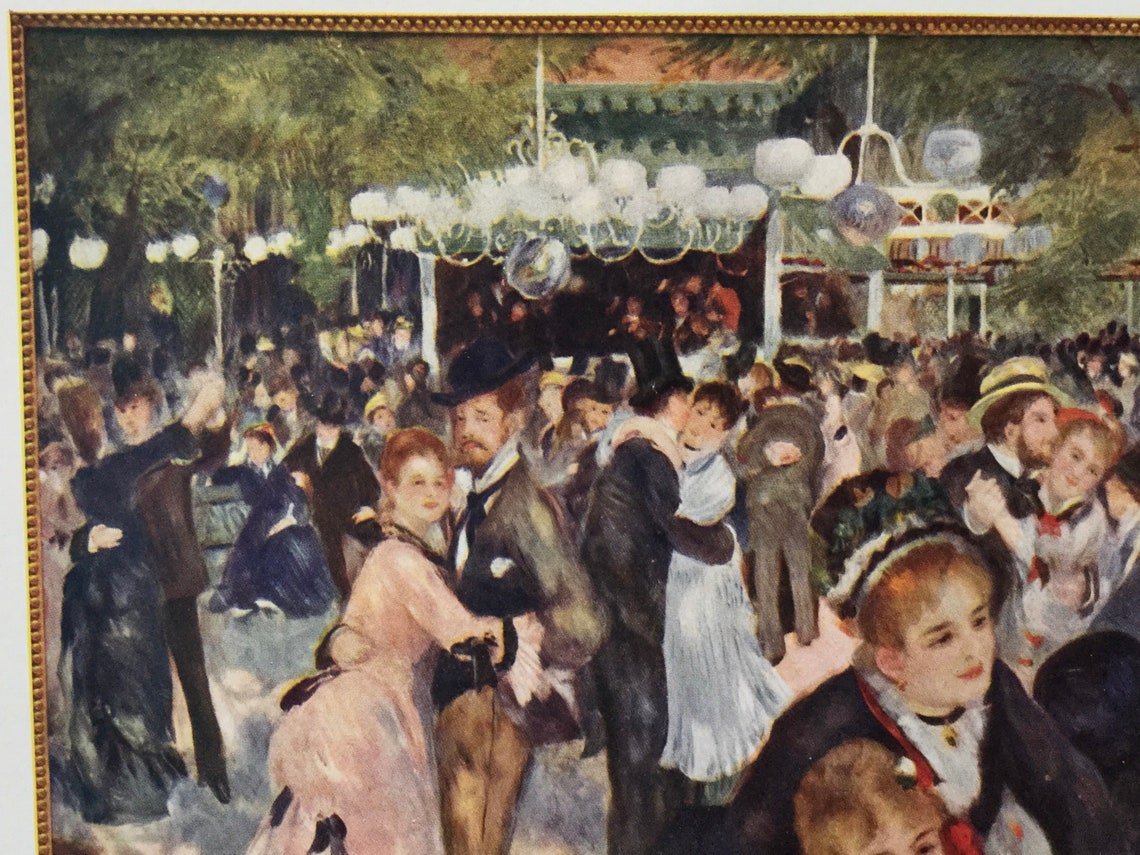
1930 PARIS Auguste RENOIR Le bal du Moulin de la Galette Etsy
Pierre-Auguste Renoir immortalizes the same location as a place for celebration and enjoyment in his Le Moulin de la Galette; Henri de Toulouse-Lautrec as a place for sometimes less than respectable rendezvous in his Au bal du Moulin de la Galette. Van Gogh treats the motif more as a picturesque, rural element.
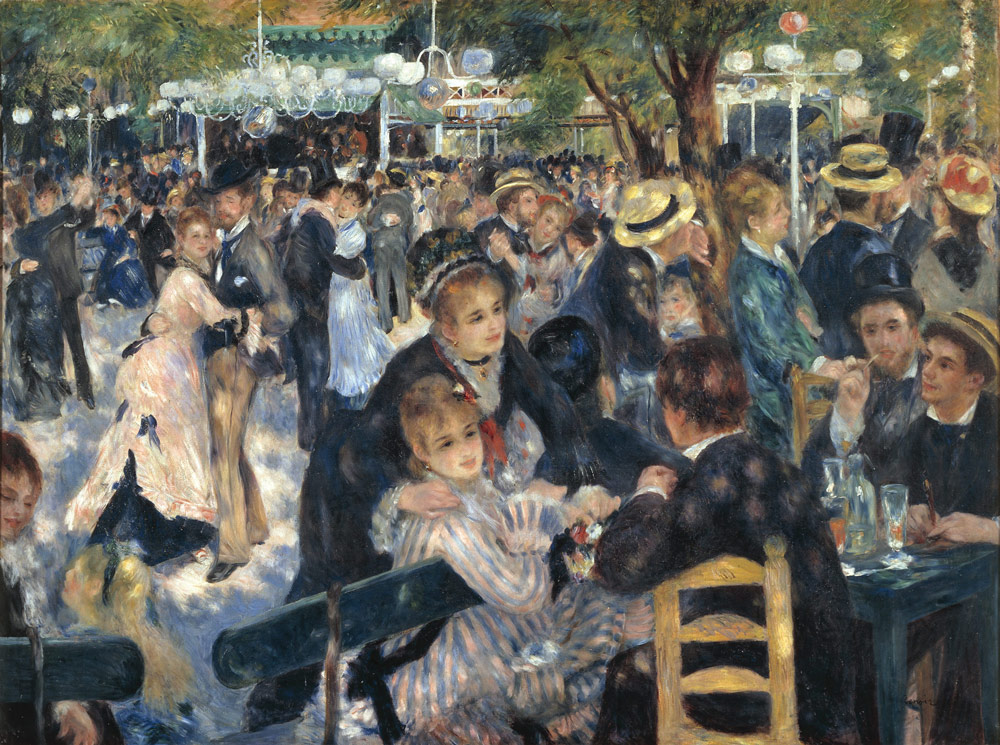
Bal du moulin de la Galette by PierreAuguste Renoir Facts & History
Del ideal moderno al ideal clasico. Colecciones de los museos d'Orsay y de l'Orangerie, "Renoir, Bal du moulin de la galette" : [exposición], Barcelona, Casa Garriga i Noguès, Fundacíon MAPFRE, 17 de septiembre de 2016-8 de enero de 2017, Barcelone, Fundacion Mapfre, 2016, p. 52-61
Riproduzioni D'arte Del Museo Danza a il moulin de la galette di PierreAuguste Renoir (1841
Bal du moulin de la Galette also known as Dance at Le moulin de la Galette is an 1876 painting by French artist Pierre-Auguste Renoir which is considered to be one of Impressionism's most talked about masterpieces. It is worth millions of dollars and is currently housed at the Musée d'Orsay in Paris. The picture depicts a normal Sunday at.

Bal du Moulin de la Galette, huile sur toile de Pierre Auguste Renoir Le blog de acbx41
One of Auguste Renoir's most important works, Bal du moulin de la Galette (Dance at Le Moulin de la Galette) was first exhibited at an Impressionist show in 1877. The painting shows some of the painter's own friends in a joyous scene at the popular dance garden of Butte Montmartre. The crowd is lit with flickering natural and artificial light.

'Bal du moulin de la Galette' Renoir; Musée d'Orsay, Paris. Arte impressionista, Pierre
Bal du moulin de la Galette (commonly known as Dance at Le moulin de la Galette) is an 1876 painting by French artist Pierre-Auguste Renoir. It is housed at the Musée d'Orsay in Paris and is one of Impressionism's most celebrated masterpieces. The painting depicts a typical Sunday afternoon at the original Moulin de la Galette in the district.

Bal du Moulin de la Galette, Montmartre by PierreAuguste Renoir RoyalCanvas.ca
French painter Pierre-Auguste Renoir created Bal du moulin de la Galette, also known as Dance at Le moulin de la Galette, in 1876. One of the most well-known.

"Bal du Moulin de la Galette" Fine Art Print by Renoir (18411919), Created with EncreLuxe Printing
Auguste Renoir, Moulin de la Galette. Auguste Renoir, Moulin de la Galette. by Dr. Steven Zucker and Dr. Beth Harris. Pierre-Auguste Renoir, Moulin de la Galette, 1876, oil on canvas, 51 1/2 x 68 7/8 in. (131 x 175 cm), (Musée d'Orsay, Paris)

Bal Du Moulin De La Galette Renoir Analysis
Bal du moulin de la Galette (commonly known as Dance at Le moulin de la Galette) is an 1876 painting by French artist Pierre-Auguste Renoir. It is housed at the Musée d'Orsay in Paris and is one of Impressionism's most celebrated masterpieces.
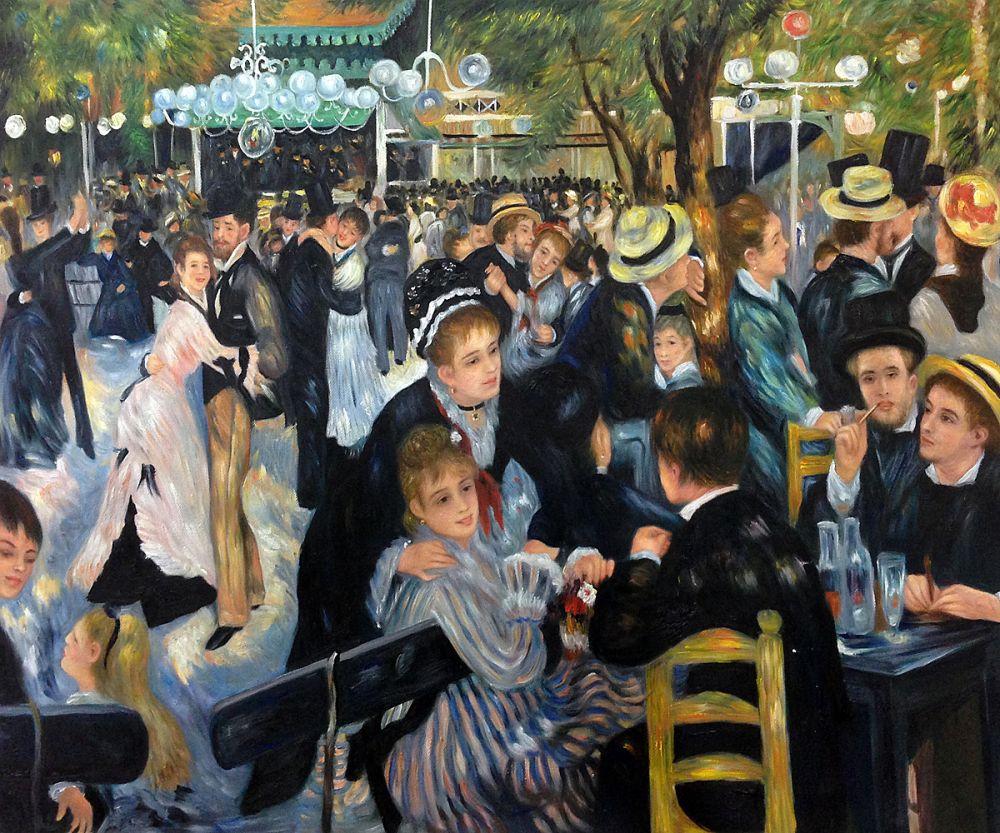
PierreAuguste Renoir, Ball at the Moulin de la Galette Hand Painted Oil Painting on Canvas
Le Bal du moulin de la Galette est une huile sur toile du peintre impressionniste français Auguste Renoir, réalisée en 1876. Le tableau actuellement conservé au musée d'Orsay, à Paris a été acquis en 1894 par legs du peintre et collectionneur Gustave Caillebotte.
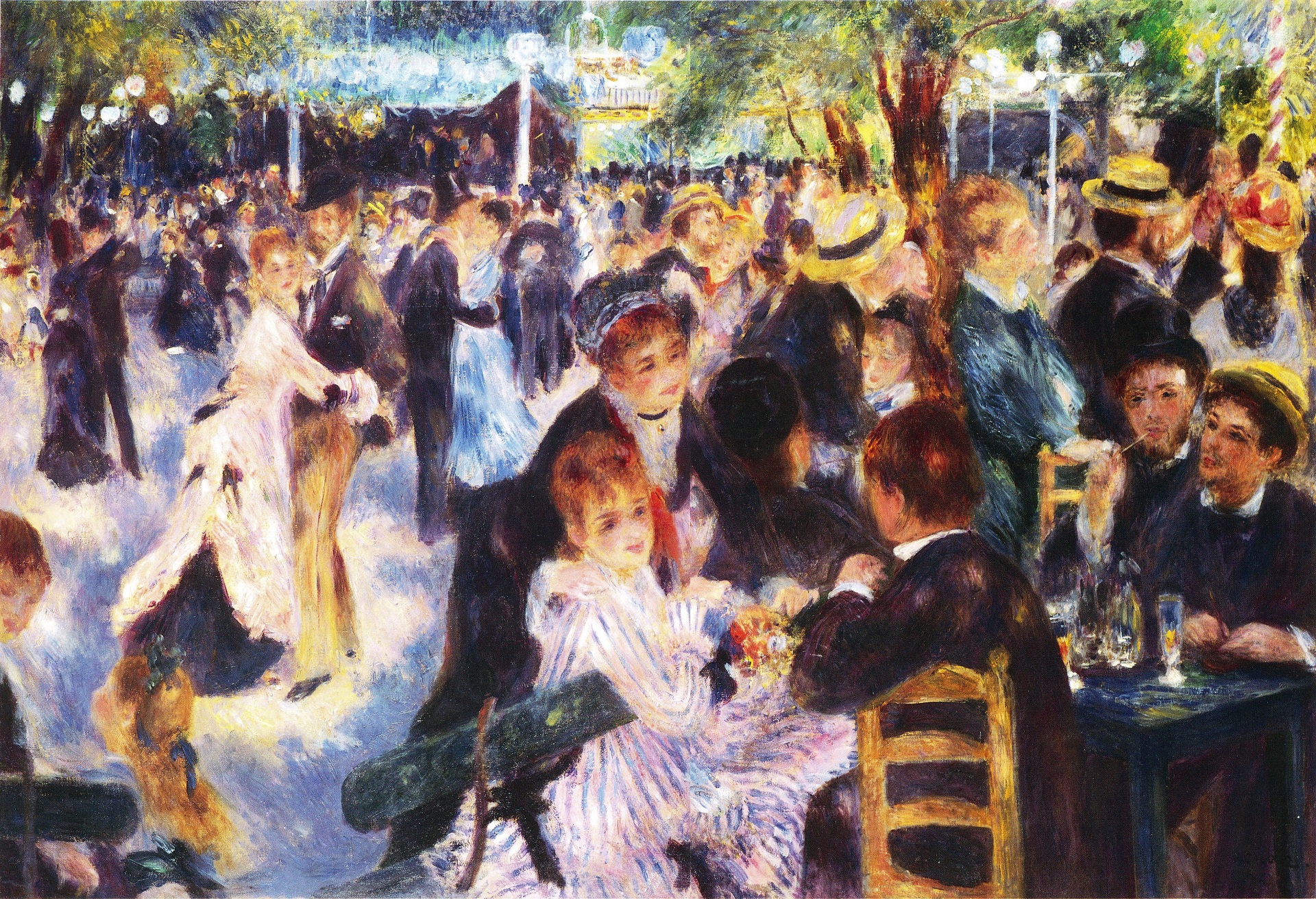
PierreAuguste Renoir Bal du moulin de la Galette 1876 USD 78.1 million
The Moulin de la Galette is a windmill and associated businesses situated near the top of the district of Montmartre in Paris. Since the 17th century the windmill has been known for more than just its milling capabilities.. Bal du moulin de la Galette. Windmill The present day Moulin de la Galette restaurant topped by the original Moulin.

Bal au Moulin de la Galette (Renoir) PierreAuguste Renoir Wall tapestries Mille Fleurs
The windmill Moulin de la Galette was built in 1622. At the end of the Napoleonic Wars in 1814, during the siege of Paris, three family members lost their lives defending the windmill against Cossacks; the miller was killed and nailed to the wings of the windmill. During the Franco-Prussian War in 1870, Montmartre was attacked by 20,000.

"Bal du moulin de la Galette( Dance at Le moulin de la Galette)PierreAuguste Renoir" Graphic T
Bal du moulin de la Galette, 1876. Bal du moulin de la Galette (English: Dance at Le moulin de la Galette) (1876) is a painting by Pierre-Auguste Renoir.It is in the Musée d'Orsay in Paris.The painting depicts a typical Sunday afternoon at Moulin de la Galette in the district of Montmartre.In the late 19th century, working class Parisians would dress up and spend time there dancing, drinking.
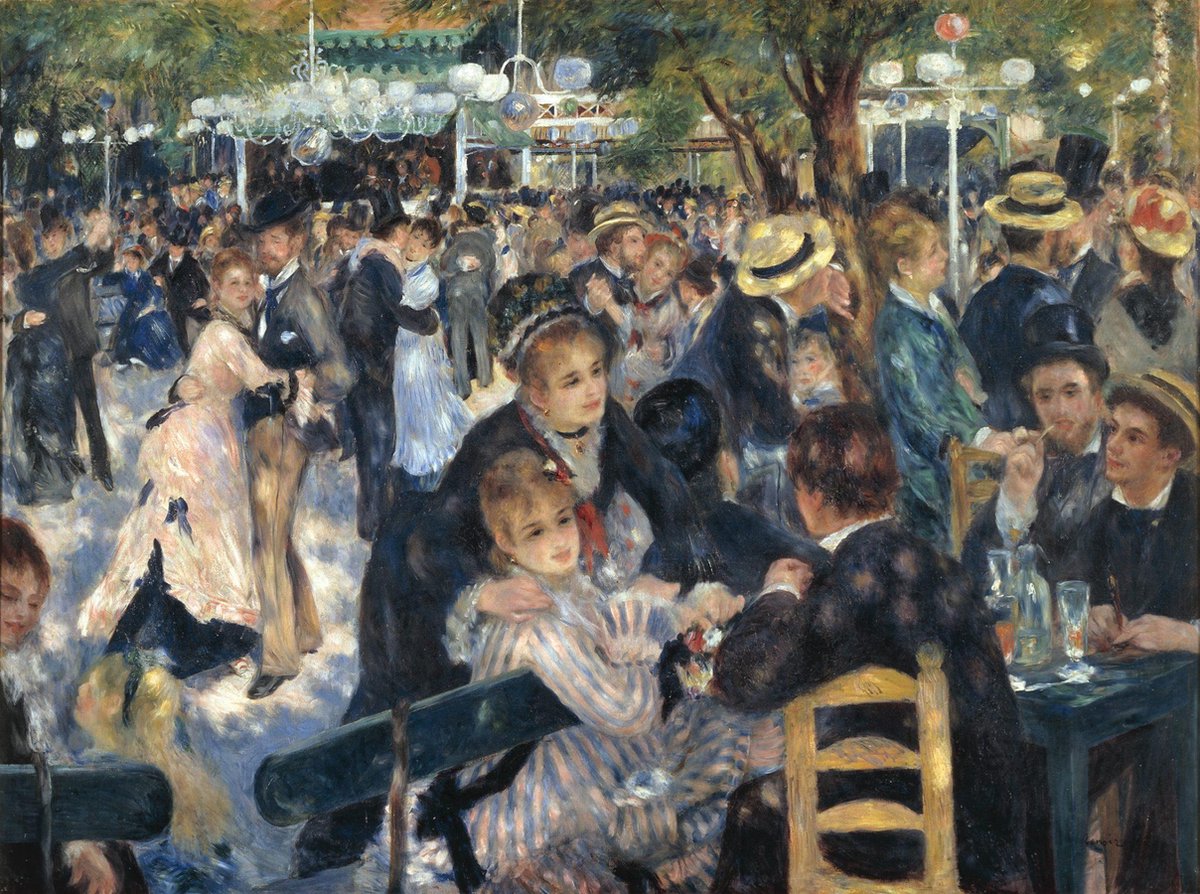
PierreAuguste Renoir, Bal du moulin de la Galette, 1876 op canvas, afmetingen van dit...
Le Moulin de la Galette is also known as Bal du moulin de la Galette and is considered one of Renoir's most important works of the mid 1870s. This painting was first shown at the Impressionist exhibition of 1877 and demonstrated the original technique developed by Renoir.

Pierre Auguste Renoir, "Bal du Moulin de la Galette", 1876, oil on canvas, 131 x 175 cm, Musée d
The Bal du moulin de la Galette showed a typical scene of late 1800's working class people, who on a Sunday afternoon, would dress up and while passing time dancing, drinking, and eating galettes. It is oil on canvas painting measuring 131 x 175 cm. Renoir also painted a smaller version with the same title and this measured 78 x 114 cm.
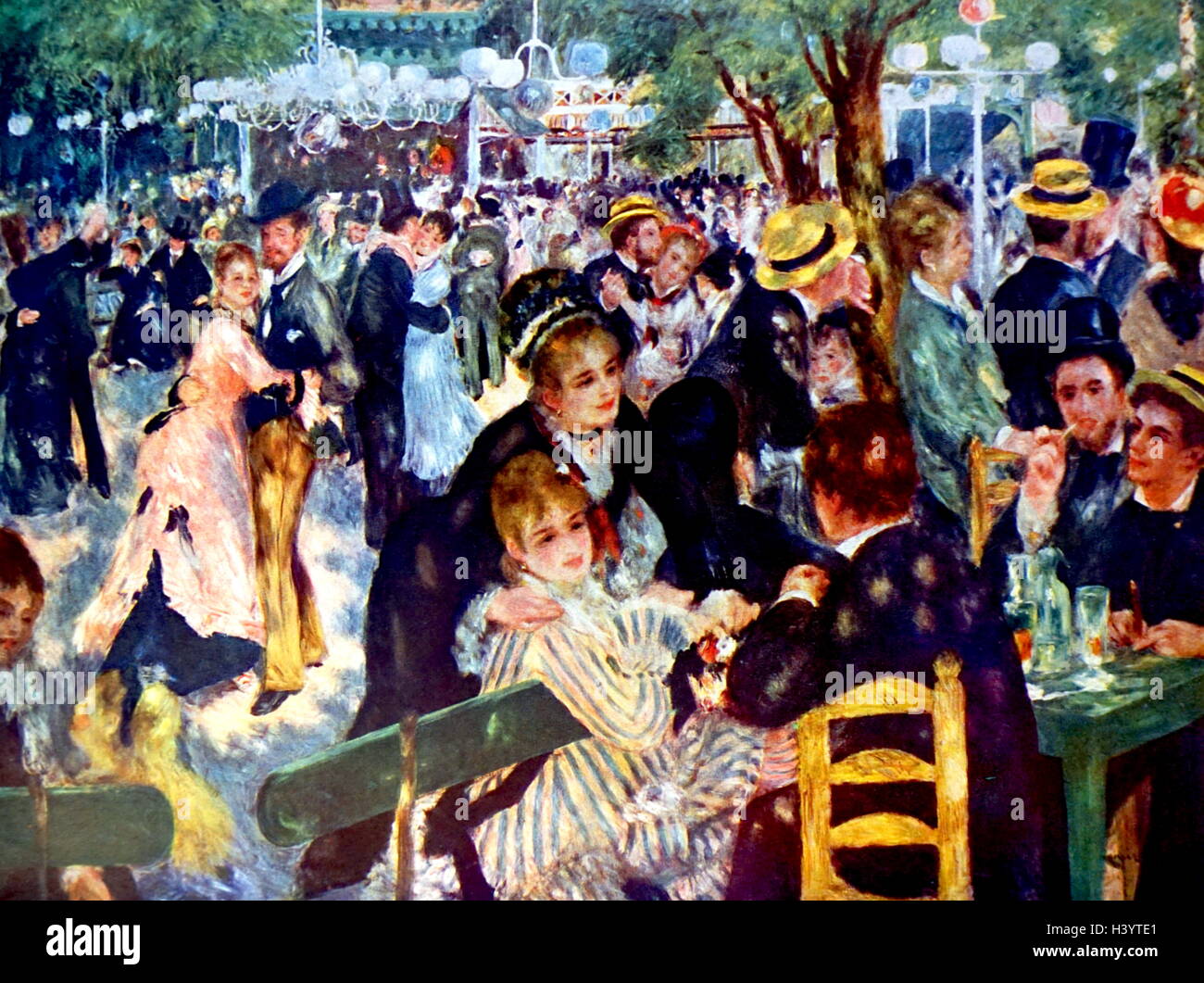
Painting titled 'Bal du Moulin de la Galette' by PierreAuguste Renoir (18411919) a French
Renoir created Bal du moulin de la Galette, an oil painting measuring 52″ by 69″, in 1876.At this time, Impressionism was still in its early stages; Renoir, Claude Monet, Edgar Degas, and Camille Pissarro had held the inaugural Impressionist exhibition just two years prior.By this point, however, the artists associated with the movement had developed unique yet unified approaches to painting.